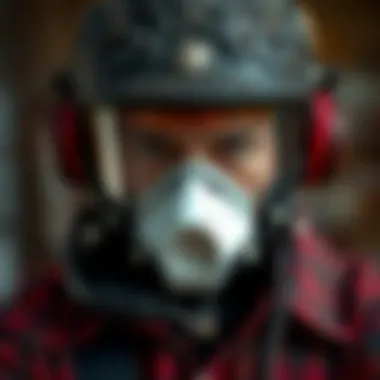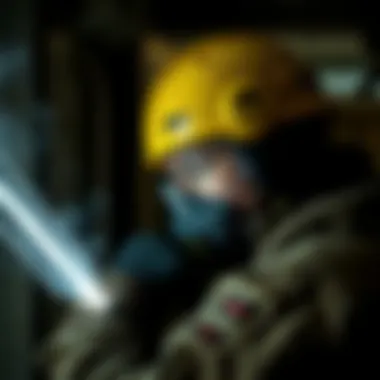Effective Pest Control Strategies for Huntsville Residents


Intro
Pest control in Huntsville isn’t just a matter of keeping your home free from ants and cockroaches; it requires a thorough understanding of local ecosystems, pest behaviors, and effective management techniques. Homeowners, particularly housewives, play an essential role in maintaining a pest-free environment, as they are often on the front lines in the battle against invading insects and rodents. This article is carefully crafted to provide insight into the myriad factors that contribute to pest activity in the area, offering practical prevention techniques and exploring sustainable pest control strategies.
In Huntsville's distinct climate, different pests thrive during various seasons, adding layers of nuance to management efforts. Furthermore, the efficacy of pest control solutions can significantly improve when strategies are tailored to local needs and pest behaviors. It’s crucial to grasp not only how to deal with pests when they appear, but also how to prevent them from making their home in yours in the first place. Read on to explore the important aspects of pest management, ensuring a safer and healthier living space.
Understanding Pests
Definition of Pests
Pests are organisms that cause discomfort, damage, or spread disease in human habitations. This extends beyond the classic image of bugs in the pantry. In Huntsville, pests can range from small insects like mosquitoes and termites to larger animals such as raccoons and deer. Understanding their behavior and life cycles is vital to implementing effective pest control measures.
Importance of Pest Identification
Identifying the specific type of pest is half the battle. Each species has its own behaviors, life stages, and vulnerabilities. For example, differentiating between a harmless spider and a dangerous black widow can make a significant difference when considering your next move. This identification allows for precise treatment options that are more effective and target the root of the problem.
“Knowledge is power, especially when it comes to battling pests in your home.”
Prevention Techniques
Home and Garden Preventative Measures
When it comes to pest management, prevention is often the best strategy. A healthy home environment can deter pests from taking up residence. Here are some practical steps homeowners can take:
- Sealing Entry Points: Regularly inspect your home for cracks and crevices. Use caulk to seal openings in walls, windows, and doors.
- Proper Food Storage: Keep food in airtight containers to avoid enticing unwanted guests into your home.
- Regular Cleaning: Vacuuming and cleaning surfaces can minimize food remnants that attract pests.
In the garden, avoid overwatering and excess debris, as standing water and clutter can become breeding grounds for pests.
Seasonal Prevention Tips
Each season brings unique challenges in pest control. Understanding these seasonal patterns can significantly enhance your ability to prevent infestations:
- Spring: Inspect your home for ants. Spraying entry points can minimize their chances of coming inside.
- Summer: Keep gardens well-maintained. Trim overgrown foliage to eliminate hiding spots for pests.
- Fall: Rodents may seek shelter as temperatures drop. Ensure that your yard is free of debris and food sources.
- Winter: Check for any signs of winter pests that may be hiding in your attic or basement.
Eco-Friendly Pest Control Solutions
Overview of Sustainable Practices
When considering pest control solutions, eco-friendliness has become a significant priority for many homeowners. Sustainable practices not only protect the environment but also ensure the health of your family and pets. Integrated Pest Management (IPM) is one common strategy that emphasizes natural pest control over chemical ones.
Natural Remedies and Their Effectiveness
While chemical solutions may provide quick results, they often come with risks. Many homeowners are turning to natural remedies, which can be equally effective:
- Diatomaceous Earth: This powdery substance can be sprinkled in areas prone to pest activity, effectively dehydrating and killing crawling insects.
- Essential Oils: Peppermint and tea tree oil can repel various pests. Mix a few drops with water in a spray bottle for a natural deterrent.
These solutions not only ensure a safer home environment but also work harmoniously with the local ecosystem, minimizing the impact on beneficial insects and wildlife.
Overview of Pest Control in Huntsville
Pest control is a critical aspect of home maintenance, especially in Huntsville, where the subtropical climate creates a favorable environment for numerous pests. Understanding how pest control functions locally helps homeowners protect their property, health, and gardens. It’s vital to address not only the presence of pests but also to comprehend their behavior and lifecycle, which plays a significant role in effective management strategies.
Huntsville's unique ecosystem presents particular challenges and opportunities when it comes to pest control. By recognizing common pests and knowing the techniques available for their management, homeowners can make informed decisions that safeguard their living spaces. This deeper dive into pest control emphasizes preventative measures over reactive solutions, aiming to cultivate an environment that minimizes pest invasions before they start.
Historical Context
Historically, the landscape of pest control in Huntsville has evolved significantly. Initially, the focus was on immediate solutions, often involving harsh chemicals that not only targeted pests but also posed risks to human health and surrounding wildlife. As awareness of environmental issues grew, so did the approach to pest management. Residential areas expanded, and certain pests became more prevalent, leading to the need for tailored solutions.
Local regulations have also evolved, reflecting a shift towards sustainable practices. For instance, the use of certain pesticides is strictly controlled to minimize impact on local ecosystems. This reflects a broader recognition of the importance of maintaining a balanced environment. Increased research into integrated pest management (IPM) has provided the foundation for modern techniques and approaches that blend traditional methods with eco-friendly practices.
Current Challenges
Despite advancements, challenges remain in the realm of pest control in Huntsville. Rapid urbanization and weather changes can contribute to increased pest populations. With more people moving into the area, pests like cockroaches, termites, and mosquitoes are finding new niches. Homeowners often find themselves facing an uphill battle against infestations that seem to appear overnight.
An emerging concern within this context is the increased resistance of pests to certain treatments. This has pushed pest control professionals to adapt and develop new strategies, relying on a combination of chemical and non-chemical interventions. Additionally, social media platforms, such as Reddit and Facebook, have become hotspots for sharing personal experiences and recommendations, complicating the landscape further.
Navigating these intricacies requires homeowners to stay informed about local pest activity trends, challenges, and proactive management approaches. Understanding these ongoing challenges is essential for anyone looking to ensure their home remains a pest-free zone.
"Efforts to mitigate pest populations must evolve with changing environments and resistances."
Common Pests in Huntsville
Understanding the common pests found in Huntsville is crucial for homeowners looking to protect their living spaces and gardens. These pests not only pose a health risk but can also cause significant damage to properties, making identification and management imperative for every homeowner. The local climate and geography play a pivotal role in the types of pests that thrive here, creating a unique set of challenges. Addressing pest issues proactively not only saves money but can also enhance the quality of life in our homes. Awareness of local pest behavior equips homeowners with the knowledge to take preventive measures before a small problem escalates into a larger one.
Identification Techniques
Identifying pests is the first step in managing them effectively. In Huntsville, common pests include termites, ants, and spiders, each with distinct characteristics. Homeowners should familiarize themselves with the appearance of these creatures to realize when unwanted guests have moved in. Look for clues such as droppings, damage to wood, or even unusual pathways in the garden. For instance, termite swarms in spring and the presence of small, winged insects can signal a growing infestation. Utilizing magnifying glasses or smartphones to capture images can help in verifying any sightings against online resources or local pest control guides.
"The earlier a pest is identified, the easier it is to manage before it turns into a full-blown infestation."
Behavior and Lifecycle
Understanding how pests behave and their life cycles is essential in predicting their next move. For example, ants often create extensive nests underground, which can lead to increased visibility in warmer months when they search for food. Recognizing that many pests have distinct feeding times and breeding cycles can offer an advantage in managing them. Termites, for example, tend to flourish during the humid months, so aggressive monitoring during those periods increases the chances of catching them early. Behaviorally, pests will often leave trails or signs of disturbance in their environment, which, when monitored regularly, helps in gauging their activity.
Impact on Homes and Gardens
The impact of pests on homes and gardens in Huntsville can be profound. Beyond the obvious damage to wooden structures or plants, pests can hamper the overall aesthetic appeal of a garden, ruining the effort homeowners put into maintaining their green spaces. Termites can compromise the structural integrity of a home, while spiders may leave unsightly webs that deter guests. Furthermore, certain pests such as aphids can destroy flowering plants or veggies.
These infestations can also affect property value, as prospective buyers often overlook homes with pest problems. Therefore, investing in preventative measures not only safeguards your home but also protects your investment in the long run. Homeowners should always be on the lookout for signs of pest activity and act quickly to mitigate any potential issues. Regular inspections and maintenance can dramatically reduce the risks of severe infestations.
In summary, a keen understanding of common pests, their identification, behavior, and impact on homes and gardens will empower homeowners in Huntsville to take a proactive approach in their pest control efforts.
Preventive Measures for Pest Control


Preventive measures for pest control are crucial for homeowners and gardeners in Huntsville. These practices can help mitigate the chances of infestations before they start, saving time, money, and frustration down the line. By adopting a proactive approach, property owners can create an environment that is less hospitable to pests while maintaining the health and beauty of their homes and gardens. The benefits of preventive measures extend beyond immediate pest deterrence, as they often promote a holistic understanding of one’s living space and its ecological dynamics.
Home Maintenance Tips
Keeping a well-maintained home is the first line of defense against unwanted pests. Simple repairs and routine upkeep can go a long way in ensuring that pests do not find their way into your living spaces. Here are some effective tips:
- Seal Entry Points: Inspect doors, windows, and other openings for gaps. Installing weather stripping or using caulk can prevent insects like ants or spiders from sneaking inside.
- Repair Leaks Promptly: Moisture attracts pests like termites and cockroaches. Fixing leaky faucets or pipes can help keep these bothersome critters at bay.
- Store Food Properly: Keep food items sealed in airtight containers. Glass jars or plastic bins with lids can prevent hungry invaders from feasting on household supplies.
- Maintain Cleanliness: Regular cleaning and decluttering can make a significant difference. Pay attention to crumbs or spills, as these can act as food sources for pests.
- Regular Disposal of Trash: Ensure that trash cans are sealed and emptied regularly. This reduces the likelihood of attracting rodents and other pests looking for a meal.
"An ounce of prevention is worth a pound of cure."
Gardening Strategies
Gardens can be a haven for pests if they are not adequately managed. To foster growth and enjoyment of your plants while minimizing pest issues, consider the following strategies:
- Choose Native Plants: Opt for plants that are native to the area, as they are more resistant to local pests and capable of thriving without excessive care.
- Crop Rotation: Changing the location of crops each season can disrupt pest reproduction cycles. This is especially important for vegetable gardens, where certain pests tend to concentrate.
- Companion Planting: Certain plants can repel pests when grown alongside other plants. For example, marigolds are known for deterring nematodes and other common garden invaders.
- Regular Monitoring: Frequently check your plants for signs of pests or disease. Early detection can prevent a small problem from turning into a large infestation.
- Use Barriers: Utilizing row covers or netting can physically protect plants from insects while allowing sunlight and rain through.
Implementing these preventive measures can dramatically reduce pest issues in and around your living space. Each strategy contributes not only to pest control but also enhances the aesthetics and overall health of your home and garden. By investing time and care into these practices, homeowners in Huntsville can enjoy thriving environments that are less prone to infestations.
Eco-Friendly Pest Control Solutions
Eco-friendly pest control solutions have become not just a choice, but a necessity in today’s world. As pests continue to invade homes in Huntsville, homeowners increasingly seek methods that mitigate harm to the environment while effectively managing pest populations. This section explores essential components and advantages of adopting sustainable practices in pest control, as well as considerations to keep in mind.
Adopting eco-friendly pest control is important not only for reducing chemical exposure but also for the health of the local ecosystem. Endorsing approaches that embrace nature’s own defenses assists in promoting biodiversity while keeping the pest population in check. In Huntsville, where lush gardens and outdoor spaces are a staple, it’s crucial to adopt methods that have a minimal ecological footprint.
Benefits of Eco-Friendly Pest Control Solutions:
- Healthier Living Environments: Minimizing the use of harsh chemicals can lead to cleaner air and safer indoor conditions for families and pets.
- Sustainable Practices: Eco-friendly methods often utilize renewable resources and natural materials, which reduces the demand for synthetic pesticides.
- Long-term Solutions: Many eco-friendly approaches focus on prevention and long-term pest management, rather than simply targeting symptoms.
While the benefits are numerous, there are also considerations that homeowners in Huntsville should keep in mind when implementing these solutions. Some natural pest control measures may take longer to show results compared to conventional methods, requiring patience and consistent application. However, the trade-off often results in healthier ecosystems and less concurrent pest resistance.
"Engaging in eco-friendly pest control not only benefits individual households, but also fosters a healthier community and environment."
Natural Repellents
Natural repellents offer a practical solution for keeping pests at bay without resorting to synthetic chemicals. Ingredients such as essential oils, vinegar, and garlic have long been hailed for their repellent qualities, making them excellent choices for eco-conscious homeowners in Huntsville.
Common Natural Repellents:
- Peppermint Oil: Known to repel mice and spiders. A few drops on cotton balls placed strategically can deter these intruders.
- Cinnamon: A sprinkle around entry points can discourage ants and other crawling pests.
- Neem Oil: Often utilized in gardens, it disrupts insect growth and acts as a natural pesticide.
Using natural repellents can also mean getting creative. Homeowners can craft their own mixtures tailored to specific pest issues. Simple solutions not only empower residents but also encourage a hands-on approach to pest management.
Integrated Pest Management Approaches
Integrated pest management (IPM) is a holistic strategy combining various pest control methods tailored to local conditions. This approach is gaining traction in Huntsville as a smart, eco-friendly alternative to traditional pest control.
Key Aspects of Integrated Pest Management:
- Monitoring and Identification: Regular inspection of gardens and homes to identify pest populations before they escalate.
- Cultural Practices: Implementing changes in gardening or home maintenance practices can discourage pest populations. This can include rotating crops in gardens or keeping firewood stored away from the home.
- Biological Controls: Using natural predators, such as ladybugs for aphid control, helps keep pest numbers in check without harmful chemicals.
- Chemical Control as Last Resort: Chemicals, if absolutely necessary, should be selected based on their impact on non-target species and the environment.
Homeowners are often surprised to learn how effective IPM can be, relying on a variety of natural solutions over time and reducing the need for chemical interventions. A neighborhood of homes can collectively apply IPM principles, resulting in a significant positive impact on local pest populations.
Identifying Pest Infestation
Identifying a pest infestation is crucial in managing any potential damage before it escalates. Knowing how to spot the early signs of a pest problem can save homeowners both time and money, while also preserving the integrity of their living spaces. Early detection allows for effective control methods, which can prevent significant infestations that might require costly treatments. More than just an inconvenience, pest issues often lead to health risks and other complications if ignored.
Signs of Infestation
Detecting a pest infestation involves keen observation. Several indicators can flag an infestation in its early stages:
- Droppings: One of the most common signs of pests, whether it’s the small pellets of mice or the larger droppings of rats, can be found in kitchens or along baseboards.
- Damage to property: Look for gnaw marks on furniture, wood, or electrical wiring. This is particularly true for rodents, which can chew through various materials in search of food or nesting.
- Chewed wires or insulation: It can be alarming to find wires exposed after pests have been at work. Not only does this indicate a pest issue, but it can also pose a fire hazard.
- Nests: Finding nests can be a clear sign of larger infestations. Rodent nests often are made from shredded materials like paper or cloth and can be found in hidden areas of the home.
- Unusual sounds: Scratching or thumping noises coming from the walls or ceilings often means pests are active at night.
- Pharmaceutical signs: Signs of gnawing or stains often go hand-in-hand with the presence of ants, especially if food sources are involved.
These identifiable signs can act as red flags for homeowners. It is essential to keep a vigilant eye on your surroundings, checking for unusual movements or changes that might indicate pests have decided to make your home their own.
When to Call a Professional
Determining when to enlist the help of a pest control professional can be a bit murky. Although some homeowners feel comfortable handling minor issues on their own, specific situations warrant professional intervention.
- Rapid population growth: If you notice a sudden surge in pest activity, especially if it concerns rodents or insects that reproduce quickly, it’s best to call in the experts.
- Health concerns: Some pests carry diseases that present significant health risks to humans and pets. Addressing these risks promptly through professional services can mitigate larger problems.
- Persistent infestations: If your DIY efforts haven’t yielded results after a reasonable period, seeking a professional’s insight may be necessary.
- Structural damage: Instances where you see severe damage to property or any sign of termites warrant immediate professional attention to prevent long-term harm.
- Inaccessible areas: If pests are nesting in hard-to-reach places like attics, HVAC systems, or within walls, it indicates a level of complexity that often requires specialized tools and knowledge.
"The longer you wait to address a pest problem, the more entrenched and extensive the issue can become. Don't hesitate to get professional help when you sense something unusual."
Choosing to contact a pest control service combines knowledge and experience, ensuring that an appropriate strategy is implemented in a timely manner. The consequences of ignoring a problem can be far-reaching, affecting not just homes, but also the health of those within them.
In summary, the art of identifying pest infestations rests on a sharp eye and a clear understanding of what to look for. Both proactive measures and timely professional intervention can go a long way in keeping Huntsville homes pest-free.
Pest Control Techniques
When it comes to tackling the persistent issue of pests in Huntsville, understanding various pest control techniques is essential. Each method offers unique benefits while also demanding careful consideration of factors such as effectiveness, safety, and environmental impact. Homeowners need to be equipped with this knowledge to choose the best approach for their specific situation. With pest populations constantly adapting, employing a well-rounded strategy makes all the difference in safeguarding one’s home and garden.
Chemical Control Methods
Chemical control methods involve the use of synthetic or natural pesticides designed to eliminate or manage pest populations. These substances can be highly effective when applied correctly. However, several important factors must be considered:
- Application Timing: The right timing can significantly affect the efficacy of chemical treatments. For instance, applying pesticides during peak activity times of the target pest is crucial.
- Target Selection: It’s essential to use ingredients that are specific to the pest being targeted. Broad-spectrum pesticides may kill beneficial insects, leading to an imbalance in the ecosystem.
- Safety Precautions: Homeowners should always follow safety guidelines to minimize exposure during application—wearing protective clothing and ensuring pets and children are kept away is paramount.
"Effective pest control is not just about eradicating pests, it's about managing the balance within the home environment."
Furthermore, some local regulations may restrict certain pesticides, so it’s wise to familiarize oneself with local laws before proceeding. More information about chemical regulations can be found at *.gov.
Physical Control Techniques
Physical control techniques encompass a range of non-chemical strategies to keep pests at bay. This might include:


- Traps: Sticky traps, snap traps, and pheromone traps are efficient methods of capturing specific pests, from rodents to insects. A well-placed trap can make a real dent in a problem if monitored regularly.
- Barriers: Installing screens on windows and doors, weather stripping, and sealing off cracks can prevent many pests from entering the home. It's about creating a fortress that pests cannot breach.
- Environmental Manipulation: Adjusting the landscape to deter pests can have a lasting impact. This may mean removing standing water to deter mosquitoes or using physical mulch to discourage ants and other crawling pests.
Physical control requires a proactive approach, focusing on prevention rather than reaction. Moreover, it often complements other strategies, creating an integrated pest management plan that works seamlessly together.
Biological Control Methods
Biological control methods leverage natural predators and pathogens to manage pest populations. This includes:
- Predatory Insects: Introducing ladybugs to control aphid populations in gardens or using parasitic wasps against caterpillars can create a natural balance.
- Beneficial Nematodes: These microscopic worms attack soil-borne pest larvae and are effective against grubs and other pests. Integrating them into garden maintenance can reduce the need for synthetic fertilization too.
- Microbial Pesticides: Utilizing bacteria or fungi that specifically target pests can supplement traditional control measures. Products containing Bacillus thuringiensis, for example, can be very effective against specific insects while being safe for humans and pets.
Incorporating biological methods can lead to a sustainable long-term pest management plan. It’s essential, though, to ensure that the biological agents are also safe and suitable for the specific environment, considering the diversity of life in Huntsville’s ecosystems.
In summary, navigating pest control in Huntsville requires an understanding of various techniques. Whether choosing chemical, physical, or biological methods, homeowners are better equipped to create a pest management plan tailored to their individual needs and circumstances. The fluctuating nature of pest populations necessitates this holistic approach to ensure lasting results.
Local Regulations and Compliance
Navigating the complex web of local regulations and compliance around pest control is crucial for ensuring effective and lawful pest management practices in Huntsville. This topic cannot be overstated, as it affects both residential and commercial settings, shaping how pest control services are executed. Understanding these local laws helps homeowners to avoid legal pitfalls and ensures that pest control providers operate within the guidelines laid down by state and local governing bodies.
Understanding Local Laws
Local laws regarding pest control in Huntsville encompass a variety of aspects, from prohibited pesticides to the responsibilities of pest management professionals. Key regulations include:
- Pesticide Usage: The Alabama Department of Agriculture and Industries regulates which pesticides can be used within Huntsville. Knowing what’s permissible ensures homeowners do not inadvertently use harmful chemicals.
- Residences and Vacant Properties: Certain laws dictate how pest control should be approached for vacant versus occupied properties. Understanding this can help in planning an effective treatment schedule.
- Encroachment on Neighboring Properties: Local ordinances often specify how far treatments must be carried out from property boundaries to avoid disputes.
Be familiar with the specific local laws that apply in Huntsville. They can often be accessed through local government websites or platforms in this region like Huntsville City.
Licensing for Pest Control Services
Licensing is not just a piece of paper; it serves as assurance that pest control services possess the knowledge, skills, and ethical standards required to perform their duties safely and effectively. In Huntsville, pest control companies must meet certain licensing requirements, which may include:
- State Certification: Businesses providing pest control services must be certified through the Alabama Department of Agriculture. This ensures that technicians are trained and tested on safety practices and pest management techniques.
- Insurance Coverage: Properly licensed pest control companies should carry liability insurance, protecting both them and the homeowner from potential damages during pest treatment.
- Compliance Record: A reputable company should have a clear record of compliance with local and state regulations. Checking for any past violations or fines can provide insight into the company’s reliability.
"Ensuring that pest control services are licensed not only secures the quality of service but also shields homeowners from future complications."
Being aware of local laws and licensing requirements is not merely about compliance; it empowers homeowners in Huntsville to make informed decisions about pest management. By choosing licensed professionals, homeowners can rest assured that the practices employed are safe, effective, and in accordance with established legal frameworks. This is a cornerstone of responsible pest control that ultimately promotes community health and safety.
Seasonal Pest Activity Patterns
Understanding seasonal pest activity in Huntsville is crucial for homeowners who want to maintain their properties and gardens. Pests don’t operate randomly; their life cycles are closely linked to the environment and seasonal changes. Recognizing patterns of pest activity enables proactive management strategies that can save time, money, and stress.
For instance, if you know that certain pests are more active during the summer months, you can take preventive measures throughout the spring to mitigate their impact. Likewise, being aware of fall and winter dormancy helps in the preparation for spring infestations. Thus, being familiar with seasonal patterns is not just beneficial but essential for effective pest management.
Spring Pest Trends
As the weather starts to warm up and flowers bloom, many pests are waking from their winter slumber. In Huntsville, this season often sees an increase in ants, termites, and various flying insects. Spring rains can also contribute to higher humidity, creating a conducive environment for mosquitoes and other pests that thrive in moist conditions.
Key Points for Spring Pest Management:
- Ant Activity: Look for trails; they begin searching for food sources.
- Termite Swarming: Early spring signals the start of termite season. Homeowners should inspect their foundations.
- Mosquito Breeding: Ensure there are no standing water sources, as they are perfect breeding grounds.
Taking action during spring is essential. Ignoring pests now could lead to larger infestations by summer.
Summer Infestations
Summer brings longer days and higher temperatures, making it an active season for a myriad of pests. The heat accelerates the reproduction of certain insects, leading to more noticeable infestations in homes and gardens. Cockroaches, mosquitoes, and flies are among the most common pests during this time. Many homeowners may find themselves battling with more than one type of pest.
To effectively manage summer pest concerns, consider these strategies:
- Regular Lawn Maintenance: Keeping grass trimmed and plants healthy can limit pest habitats.
- Pesticide Use: While there are eco-friendly options, sometimes chemical treatments may be necessary. Follow all local regulations.
- Trap Installation: Using traps can help reduce populations of visible pests.
Fall and Winter Strategies
As the days shorten and temperatures drop, many pests prepare to hibernate or seek shelter indoors. Fall is a critical time for homeowners to fortify their homes against potential invasions. Rodents often look for warm spaces, and proper sealing of gaps and cracks becomes paramount.
Effective Strategies for Fall and Winter:
- Closing Entry Points: Inspect and seal any gaps in windows, doors, and foundations.
- Reduce Clutter Indoor: Rodents love to hide in piles of clutter. Maintaining tidiness helps reduce their appeal.
- Year-Round Monitoring: Consider regular inspections and proactive treatments to prevent surprise infestations come spring.
"Prevention is key; sealing your home before winter sets in saves time and trouble when springs pests return."
Seasonal patterns play a vital role in pest control. By being informed about these trends, homeowners can take deliberate steps to protect their spaces effectively, ultimately ensuring a pest-free environment through all seasons.
Economic Impact of Pest Infestations
When we talk about pest infestations, it’s easy to think about the nuisances caused by creepy crawlies. However, the economic implications are often underscored or ignored. Pest control is not just about eliminating unwanted guests but also about understanding the financial weight pests can carry. In Huntsville, where the economic landscape is diverse, pests can lead to significant losses that ripple through various sectors, affecting homeowners and businesses alike.
Cost of Pest Control Services
One of the pressing costs related to pests is the expense of pest control services. For homeowners in Huntsville, the financial outlay can differ based on various factors such as the severity of the infestation, the types of pests, and the businesses they engage for eradication. Here are some elements that homeowners should consider:
- Service Type: Depending on whether homeowners opt for general pest control, targeting specific pests, or preventative measures, costs can vary significantly.
- Frequency of Service: Regular visits can sometimes reduce overall costs by preventing more severe infestations.
- DIY vs. Professional Services: Homeowners might initially consider DIY solutions, but this can sometimes lead to higher costs if infestations worsen. Often, investing in expert services proves financially wiser in the long run.
If a homeowner is facing a bad infestation, the cost of professional pest control can fall between $100 to $500 or more, depending on the above factors. This price doesn't just pay for the immediate service; it's also an investment in maintaining property value and overall health safety.
Effective pest management is not merely about immediate costs—it’s about safeguarding your home’s integrity and your family's well-being.
Long-term Implications of Infestation
The stakes increase when considering the long-term ramifications of pest infestations. Beyond immediate costs, the presence of pests typically signifies an underlying issue that can exacerbate over time. For instance, structural damage from termites can lead to extensive home repairs, costing thousands. Here are other broader consequences:
- Decreased Property Value: Continuous pest issues can severely impact market value. Homebuyers are often deterred by the possibility of hidden pest damage, making it harder for sellers to retrieve their investment.
- Health-Related Expenses: Pests like rodents and cockroaches not only disrupt everyday life but also pose risks to health through allergens and diseases. The medical costs related to these health problems can accumulate quickly, leading to unplanned expenditures for families.
- Impact on Local Businesses: Businesses, especially in the food industry, face stringent health inspections. An infestation can lead to business shutdowns, reputation damage, and lost revenue during service interruption.
In the end, if homeowners in Huntsville overlook the pressing necessity for pest control, they may find themselves knee-deep not only in pest problems but also in economic hardship with far-reaching effects.


Case Studies in Huntsville
Case studies represent the practical application of pest control principles in real-world scenarios. They provide valuable insights into the effectiveness of various methods in tackling pest problems specific to Huntsville. Analyzing these examples benefits homeowners by offering a glimpse into the variety of challenges they might face. Moreover, case studies can impart lessons learned, strategies employed, and the outcomes of different remedies used, making them an essential aspect of this article.
Successful Treatment Examples
One noteworthy case in Huntsville involved a family struggling with a persistent termite infestation. Initially, the homeowners noticed signs of structural damage but were unsure of the cause. After consulting a local pest control expert, it was revealed that a lack of preventive measures, combined with the moist climate, created an environment ripe for termites.
The treatment plan involved several steps:
- Inspection: A comprehensive examination of the home’s foundation and surrounding area.
- Treatment Application: Using liquid termiticides, technicians drenched the soil around the perimeter of the house, creating a barrier.
- Monitoring: The pest control company scheduled follow-ups to ensure the treatment was effective.
Over the next few months, the homeowners reported a significant decrease in termite activity, and structural repairs were effectively made. This case highlights the importance of early detection and professional input in pest control, encouraging others to take similar proactive measures.
"Prevention and early action are always cheaper than dealing with full-blown infestations."
Another successful treatment involved a community garden battling aphids. Gardeners worked together to combat this issue by implementing biological control methods. They introduced ladybugs, a natural predator of aphids, allowing the beneficial insects to manage the pest population without chemical pesticides. Through this community effort, gardeners learned the value of collaboration and sustainable strategies in gardening and pest management.
Mistakes in Pest Management
Learning from mistakes can be just as valuable as understanding successful outcomes. A common error made by many homeowners in Huntsville is underestimating the threat of seasonal pests. For instance, a family decided to forgo professional services, believing that a few bites from mosquitoes were harmless. Their neglect led to a major mosquito breeding issue in their backyard. The oversight resulted in numerous bites, affecting their family's comfort during the summer evenings.
Key mistakes often noted in these cases include:
- Ignoring Early Signs: Procrastinating on addressing minor infestations often leads to substantial issues down the line.
- Ineffective DIY Solutions: Relying purely on over-the-counter sprays without understanding the behavior of the pests can aggravate the problem.
- Not Considering Environmental Factors: Failing to recognize how weather influences pest activity can lead to inappropriate timing in preventive methods.
Success lies in proper understanding and learning from these pitfalls. Homeowners are encouraged to remain vigilant and consider full pest management programs instead of piecemeal solutions. Continuous education on local pest behavior is paramount for successful pest control initiatives.
Community Resources for Pest Control
When it comes to managing pests in Huntsville, having access to local resources makes a world of difference. Community resources for pest control not only provide vital information but also connect residents with essential services that ensure a pest-free environment. With the right tools and knowledge, homeowners can tackle infestations before they become overwhelming. Let's break down the elements that make these resources crucial.
Local Pest Control Companies
Engaging with local pest control companies is among the best steps one can take when dealing with pest issues. These firms often have a keen understanding of the specific pest challenges that arise in the Huntsville area. Not only can they offer tailored solutions, but they understand the seasonal habits of pests unique to local climates and terrains. For instance, a company like Terminix or Orkin provides services that are specifically designed for local flora and fauna, ensuring a targeted approach.
Working with local companies also fosters a sense of community. Residents can share experiences and recommendations, building a network that helps everyone manage pest issues more effectively. Additionally, many companies offer consultations and home assessments, allowing professionals to provide options that align with each homeowner's needs.
Some important factors to consider when choosing a local pest control company include:
- Reputation: Look at customer reviews and ratings.
- Certifications: Ensure they are licensed and insured.
- Eco-friendliness: Ask about the chemicals and methods they use.
Finding the right pest control partner can help save time, money, and frustration.
Educational Programs and Workshops
Knowledge is power, especially when it comes to pest management. Educational programs and workshops are important community resources that teach residents about prevention techniques and safe pest control practices. Local governments, community centers, or non-profit organizations often host workshops that cover hands-on skills and provide insights into effective pest management strategies.
These programs can vary in focus. Some might emphasize organic gardening to keep gardens thriving while repelling unwanted guests, whereas others may provide in-depth training on understanding pest behavior or spotting the early signs of infestations. Workshops can also delve into integrated pest management, which combines multiple strategies for a comprehensive approach.
Attending these sessions not only empowers residents but also encourages community engagement. When people come together to learn and share, the knowledge transfer can lead to better outcomes for everyone involved.
Additionally, local universities or agricultural extension services may offer resources via their websites, such as articles and videos that explain various pest control techniques. Keeping abreast of these educational online resources can help homeowners stay prepared.
"Community knowledge is an invaluable asset in the fight against pests. An informed homeowner is a proactive homeowner."
Having a solid grasp of pest control through available resources can mitigate future challenges. By collaborating with service providers and engaging in educational opportunities, residents in Huntsville can navigate pest issues more effectively, creating healthier living environments.
Interacting with Pest Control Professionals
When dealing with pests, the first line of defense often lies in the hands of professionals. Having a clear strategy for interacting with these specialists can make all the difference in managing infestations effectively. Whether it’s a minor nuisance like ants or a more significant issue such as termites, understanding how to engage with pest control experts is pivotal. This section highlights the essential elements, advantages, and considerations crucial to creating a beneficial partnership with pest management services.
Effective Communication Tips
Effective communication between homeowners and pest control professionals is vital. Clear dialogue fosters mutual understanding and ensures that all parties are on the same page regarding the approach taken.
- Be Specific About Problems: When discussing infestations, provide detailed descriptions of the pests you’re encountering. Mention when you first noticed them, their behavior, and any other relevant signs. This information helps the technician tailor their strategy effectively.
- Ask Questions: Don’t shy away from asking questions. Inquire about the pest lifecycle, potential damage, or even health risks associated with the pests in your home. Being well-informed equips you for better decision-making.
- Discuss Expectations: Address what you expect from the service. Whether it’s a long-term maintenance plan or a one-off treatment, clarity in your desires can lead to satisfactory outcomes.
- Follow-Up: After initial services, set up a follow-up communication. This could involve asking about preventive measures or additional treatments if necessary. Following through shows your commitment to maintaining pest-free premises.
Understanding Service Agreements
A service agreement is an often overlooked but extremely important aspect of pest control services. Understanding these agreements helps homeowners grasp what they’re signing up for, avoiding any potential misunderstandings later down the line.
- Scope of Services: Agreements typically outline the specific services provided. Make sure you understand everything from initial inspections to ongoing treatments, as well as the type of pests covered.
- Terms and Conditions: Read through the fine print. Knowing about guarantees, cancellation policies, and responsibilities can protect you from surprises later on.
- Pricing Structure: Clear information on the pricing can save homeowners a heap of headaches. Understand whether the costs are one-time fees or ongoing charges and what’s included in that price.
- Liability and Insurance: Ensure you know the company's liability policies. In case of any damage caused during treatment, understanding their insurance policies can be crucial.
The Future of Pest Control in Huntsville
As we peer into the horizon of pest control in Huntsville, it's essential to understand that the next wave of strategies and technologies holds promise for both curbing pest populations and minimizing the impact on the environment and human health. The landscape of pest control is evolving, and this progression brings with it new methods that can benefit homeowners, gardening enthusiasts, and pest management professionals.
The importance of looking towards the future cannot be overstated. The challenges posed by pests are continually shifting due to various factors, including climate change, urbanization, and changing pest behavior. Therefore, it is critical to adapt and integrate new technologies and practices that address these challenges effectively.
Emerging Technologies
In the realm of pest control, emerging technologies are taking center stage, offering innovative solutions that were but a dream just a few years ago. For instance, smart traps equipped with sensors can monitor pest activity in real-time, providing homeowners with the information needed to act swiftly. These devices can alert users through apps on their smartphones, allowing for timely interventions before an infestation takes root.
Moreover, advances in biotechnology are revolutionizing how we think about pest control. Genetic engineering is being explored to create pest-resistant crops, which can significantly reduce the need for chemical pesticides. This not only protects crops but also safeguards beneficial insects and the broader ecosystem.
The rise of drones in pest management is another interesting development. These aerial devices can efficiently survey large areas for pest populations, reducing the time and manpower needed for inspections. Drones can also apply treatments more precisely, minimizing pesticide waste and environmental impact.
"Incorporating technology into pest management not only enhances efficiency but also aligns with the growing demand for environmentally responsible practices."
Other notable technologies include remote sensing and artificial intelligence, which can predict pest outbreaks based on data analytics and historical patterns, allowing for proactive measures rather than reactive ones.
Sustainable Practices Adoption
The future of pest control also hinges on the adoption of sustainable practices that prioritize ecological balance. Integrated Pest Management (IPM) is gaining traction as a holistic approach that emphasizes long-term prevention rather than quick fixes. This might involve a combination of biological control methods, cultural practices, and chemical controls, used sparingly and only when absolutely necessary.
Homeowners can contribute by implementing sustainable gardening strategies. For example, planting native species can promote biodiversity, attracting natural predators that help control pest populations. Rotating crops and adopting companion planting can also deter pests naturally, minimizing reliance on chemicals.
Furthermore, community engagement in awareness and education is pivotal. Local workshops and programs that educate homeowners about sustainable practices in pest management can foster a culture of responsibility and innovation. The more people know about these practices, the more they can contribute to a collective effort in managing pests in environmentally conscious ways.



